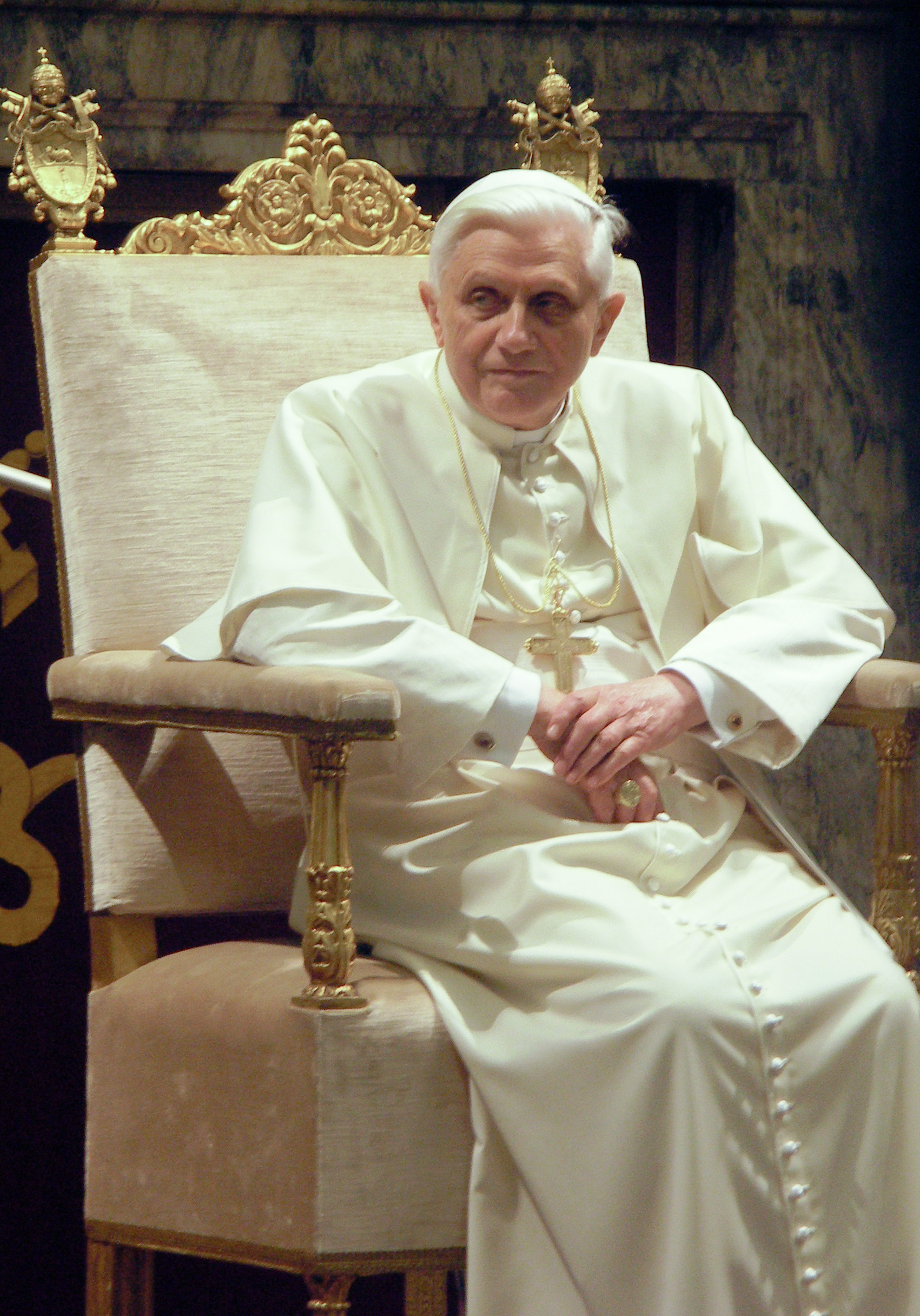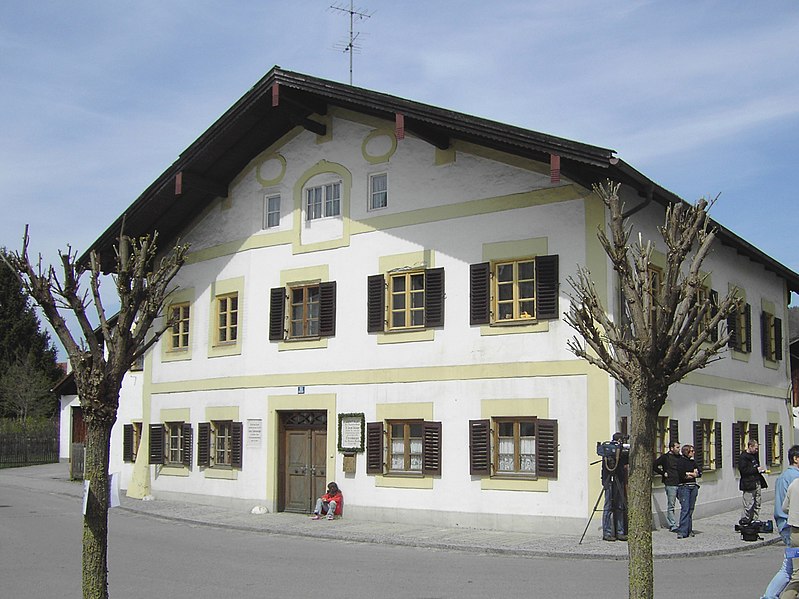His Holiness
Pope Benedict XVI, 2005-2013,
May God Bless Our Holy Father.
His Holiness Pope Benedict XVI - 2005-2013
May God Bless Our Holy Father in Christ
Pope
Benedict XVI (Latin: Benedictus PP. XVI; Italian: Benedetto XVI;
German: Benedikt XVI.; French: Benoît XVI; born
Joseph Alois Ratzinger
on 16 April 1927) is the 265th and reigning Pope, by virtue of his
office of Bishop of Rome,
the head of the Catholic Church and, as such,
Sovereign of the Vatican City State. He was elected on 19 April 2005
in a papal conclave, celebrated his Papal Inauguration Mass on 24 April
2005, and took possession of his cathedral,
the Basilica of St. John
Lateran, on 7 May 2005. A native of Bavaria, Pope Benedict XVI has both
German and Vatican
citizenship. He succeeded Pope John Paul II.

Benedict XVI is theologically conservative,
and his teaching and prolific
writings defend traditional Catholic doctrine and values. After a long
career as
an internationally noted academic, serving as a professor of
theology at various German universities, he was appointed
Archbishop of
Munich and Freising and cardinal by Pope Paul VI in 1977. In 1981, he
settled in Rome when he became
Prefect of the Congregation for the Doctrine
of the Faith, one of the most important offices of the Roman Curia. At the
time of his election as Pope, he was also Dean of the College of Cardinals,
and as such the primus inter pares
among the cardinals.
During his papacy, Benedict XVI
has emphasized what he sees as a need for
Europe to return to fundamental Christian values in response to increasing
de-Christianisation and secularisation in many developed countries. For
this reason, he proclaims relativism's denial
of objective truth-and more
particularly, the denial of moral truths-as the central problem of the
21st century.
He teaches the importance for the Catholic Church and for
humanity of contemplating God's redemptive love and has reaffirmed
the
"importance of prayer in the face of the activism and the growing
secularism of many Christians engaged
in charitable work." The Pope has
also revived a number of traditions, and notably given the Tridentine
Mass
a more prominent position.
Pope Benedict was also
the founder and patron of the Ratzinger Foundation,
a charitable organisation, which makes money from the sale of books
and
essays written by the Pope, in order to fund scholarships and bursaries
for students across the world.

Benedict XVI was elected Pope at the age
of 78. He is the oldest person
to have been elected Pope since Pope Clement XII (1730-40). He had
served longer
as a cardinal than any Pope since Benedict XIII (1724-30).
He is the eighth German Pope, the seventh having been Pope
Stephen IX
in 1057. The last Pope named Benedict was Benedict XV, an Italian who
reigned from 1914 to 1922, during
World War I (1914-18).

Born in 1927 in Marktl am Inn, Bavaria, Germany,
Ratzinger had a
distinguished career as a university theologian before being appointed
Archbishop of Munich and
Freising by Pope Paul VI (1963-78). Shortly
afterwards, he was made a cardinal in the consistory of 27 June 1977.
He was appointed Prefect of the Congregation for the Doctrine of the
Faith by Pope John Paul II in 1981 and was also
assigned the honorific
title of the cardinal bishop of Velletri-Segni on 5 April 1993.
In 1998, he was elected sub-dean of the College of Cardinals. And on 30
November
2002, he was elected dean, taking, as is customary, the title
of Cardinal bishop of the suburbicarian diocese of Ostia.
He was the
first Dean of the College elected Pope since Paul IV (1555-59) and the
first cardinal bishop elected
Pope since Pius VIII (1829-30).
Even before becoming
Pope, Ratzinger was one of the most influential men
in the Roman Curia, and was a close associate of John Paul II. As
Dean
of the College of Cardinals, he presided over the funeral of John Paul II
and over the Mass immediately preceding
the 2005 conclave in which he
was elected. During the service, he called on the assembled cardinals to
hold fast
to the doctrine of the faith. He was the public face of the
church in the sede vacante period, although, technically,
he ranked below
the camerlengo in administrative authority during that time. Like his
predecessor, Benedict XVI
affirms traditional Catholic doctrine.
In addition
to his native German, Benedict XVI fluently speaks Italian,
French, English, Spanish, Latin, and also has a knowledge
of Portuguese.
He can read Ancient Greek and biblical Hebrew. He has stated that his
first foreign language is French.
He is a member of a large number of
academies, such as the French Académie des sciences morales et politiques.
He plays the piano and has a preference for Mozart and Bach.

Resignation of Pope Benedict
XVI
On 11 February 2013, the
Vatican confirmed that Benedict XVI would resign the papacy on 28 February 2013, as a result of his advanced age,
becoming the first pope to resign since Gregory XII in 1415.
At the age of 85 years and 318 days on the effective date of his retirement, he was the fourth-oldest person to hold the office
of pope. The move was considered unexpected. In modern times, all popes have stayed
in office until death. Benedict is the first pope to have resigned without external pressure since Celestine V in 1294. In a statement, Benedict cited his deteriorating strength and the physical and mental demands
of the papacy; addressing his cardinals in Latin, Benedict gave a brief
statement announcing his resignation. He also declared that he would continue to serve the church "through a life dedicated
to prayer".
According to a statement from the Vatican, the timing of the resignation was not caused by any specific illness
but was to "avoid that exhausting rush of Easter engagements". After
two weeks of ceremonial farewells, the Pope left office at the appointed time and sede vacante was declared. On the eve of the first anniversary of Benedict's resignation he wrote to La Stampa
to deny speculation he had been forced to step down. "There isn't the slightest doubt about the validity of my resignation
from the Petrine ministry," he wrote in a letter to the newspaper. "The only condition for the validity is the
full freedom of the decision. Speculation about its invalidity is simply absurd," he wrote.

Pope
Emeritus
On the morning
of 28 February 2013, Pope Benedict met with the full college of cardinals and in the early afternoon flew by helicopter to
the papal summer residence of Castel Gandolfo. He stayed there until refurbishment was completed on his retirement home,
the Mater Ecclesiae monastery in the Vatican Gardens near St Peter's, formerly home to 12
nuns, where he moved on 2 May 2013. To protect it there will be a
thick hedge and a fence. It has more than 2,000 square meters of garden that overlook the monastery and are adjacent to
the current "Pope's garden". A few tens of meters away is the building of Vatican Radio.
After his resignation,
Benedict XVI retained his papal name rather than reverting to his birth name.
He continued to wear the white cassock but without the pellegrina or the fascia. He ceased wearing red papal shoes. Benedict returned his official Fisherman's Ring,
which is usually destroyed by Vatican officials on the death of a pope to prevent documents being counterfeited. According to a Vatican spokesman, Benedict spent his first day as pope emeritus with
Archbishop Georg Gänswein. In the monastery, the pope emeritus
will not live a cloistered life, but will study and write.
Benedict XVI made his first public appearance after his resignation
at St. Peter's Basilica on 22 February 2014 to attend the first papal consistory of his successor Pope Francis. Benedict
XVI, who entered the basilica through a discreet entrance, was seated in a row with several other cardinals. He doffed his
zucchetto when Pope Francis came down the nave of St. Peter's Basilica to greet him.
Furthermore, he made an appearance at the canonization mass of Pope John XXIII and Pope John Paul II, greeting the cardinals
and Pope Francis.In August 2014, Benedict XVI celebrated Mass at the Vatican
and met with his former doctoral students, an annual tradition he has kept since the 1970s.
He attended the beatification of Pope Paul VI in October 2014.
Benedict wrote the text of a speech, delivered by Archbishop
Georg Gänswein, on the occasion of the dedication of the Aula Magna at the Pontifical Urbaniana
University to the Pope Emeritus, "a gesture of gratitude for what he has done for the Church as a conciliar
expert, with his teaching as professor, as Prefect of the Congregation for the Doctrine of the Faith and, finally, the Magisterium."
The ceremony took place on Tuesday, 21 October 2014 during the opening of the academic year.
In 2015 Benedict
XVI, who prefers to be known as "Father Benedict", spent
the summer at Castel Gandolfo and participated in two public events. "Pope Francis invited Benedict XVI to spend some
time in Castel Gandolfo in the month of July and Benedict accepted", Fr. Lombardi told journalists on June 15. Benedict
XVI remained there for two weeks. While in Castel Gandolfo, Benedict XVI received two honorary doctorates, given to him
by Kraków's Cardinal Stanislaw Dziwisz John Paul II's longtime aide, from the Pontifical
University of John Paul II and the Kraków Academy of Music.
In his reception address, Benedict XVI paid homage to his predecessor, John Paul II.
The "Joseph
Ratzinger-Benedict XVI Roman Library" at the Pontifical Teutonic College was announced in April 2015 and is scheduled
to open to scholars in November 2015. The library section dedicated
to his life and thought is being catalogued. It includes books by or about him and his studies, many donated by Benedict
XVI himself. Benedict XVI, in August 2015, submitted a handwritten card to act as a testimony to
the cause of canonization of Pope John Paul I.

